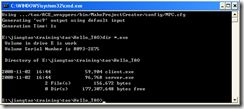跟我从头学TAO编程系列 (2) -- 编写最简单的TAO应用程序
跟我从头学TAO编程系列
编写最简单的TAO应用程序
Stone Jiang [email protected]
http://www.ace-tao.org
http://www.ace-tao.org/home/link.php?url=d3d3LmFjZS10YW8ub3JnL2Jicw%3D%3D
如果您对TAO有一定了解,却不知如何驾驭它,那请跟我来从头学学TAO编译。
如果您对TAO还不是非常了解的话,请跟我来,一起对TAO有一个初步的认识。
上一篇我们学会了如何下载、编译和安装TAO,这一节我们来编写最简单的TAO应用程序--Hello TAO!
1. 编写TAO应用程序的一般步骤
| 1) | 定义接口,编写idl文件 |
| 2) | 编写mpc文件,生成工程文件 |
| 3) | 编写server端代码 |
| 4) | 编写client端代码 |
| 5) | 编译,调试运行,查看结果 |
2.定义接口
接口(interface)在TAO(corba)编程在非重要,它定义了客户端(主动发起请求一方)向服务端(被动等待请求)之间通讯消息格式。在本例在, 我们定义了一个名为"Hello"的接口。Hello接口中具有两个方法:
get_string() 和
shutdown()
TAO用接口定义语言(idl)来表示具体的接口定义。见Hello.idl文件
| //@file: Test.idl /// Put the interfaces in a module, to avoid global namespace pollution /// A method to shutdown the ORB |
我们将接口Hello放在 module Test中,避免全局名字污染。
3.编写mpc文件
在上一篇我们简单的讲解了mpc在编译和ACE,TAO中的应用,在本节我们进一步使用mpc工具,为我们生成项目工程文件。
见Hello.mpc
| //@file: Hello.mpc project(*idl): taoidldefaults { project(*Server): taoserver { project(*Client): taoclient { |
Hello.mpc定义了三个项目(project),其中*作为占位符,替换文件名Hello,所以这三个项目分别为
1) Hello_idl
2) Hello_Server
3) Hello_Client
4. 服务端代码的编写
服务端由 Server.cpp, Hello.cpp, Hello.h组成
| // $Id: server.cpp 82798 2008-09-21 10:07:12Z johnnyw $ //@file: server.cpp #include "Hello.h" const ACE_TCHAR *ior_output_file = ACE_TEXT ("test.ior"); int while ((c = get_opts ()) != -1) case '?': int CORBA::Object_var poa_object = PortableServer::POA_var root_poa = if (CORBA::is_nil (root_poa.in ())) PortableServer::POAManager_var poa_manager = root_poa->the_POAManager (); Hello *hello_impl = 0; PortableServer::ObjectId_var id = CORBA::Object_var object = root_poa->id_to_reference (id.in ()); Test::Hello_var hello = Test::Hello::_narrow (object.in ()); CORBA::String_var ior = orb->object_to_string (hello.in ()); // Output the IOR to the ACE_DEBUG ((LM_DEBUG, "(%P|%t) server - wait for requsting from client./n")); orb->run (); ACE_DEBUG ((LM_DEBUG, "(%P|%t) server - event loop finished/n")); root_poa->destroy (1, 1); orb->destroy (); return 0; |
| //@file: Hello.cpp #include "Hello.h" #include "ace/Log_Msg.h" Hello::Hello (CORBA::ORB_ptr orb) char * void |
| //@file: Hello.h #ifndef HELLO_H #include "TestS.h" /// Implement the Test::Hello interface // = The skeleton methods virtual void shutdown (void); private: #include /**/ "ace/post.h" |
5. 客户端代码的编写
服务端由 client.cpp组件
| // @file: client.cpp StoneJiang<[email protected]> #include "TestC.h" const ACE_TCHAR *ior = ACE_TEXT ("file://test.ior"); int while ((c = get_opts ()) != -1) case '?': int if (parse_args (argc, argv) != 0) CORBA::Object_var tmp = orb->string_to_object(ior); Test::Hello_var hello = Test::Hello::_narrow(tmp.in ()); if (CORBA::is_nil (hello.in ())) CORBA::String_var the_string = hello->get_string (); ACE_DEBUG ((LM_DEBUG, "(%P|%t) - string returned <%C>/n", if (end) orb->destroy (); return 0; |
6. 编译、调试和运行
6.1 生成工程文件
在Dos Shell中输入
mwc.pl -type vc9
如下图:
6.2 打开工程文件
用Visual Studio 2008打开工程文档
编译后得到 server.exe和client.exe
6.3 运行服务端
6.4 运行客户端
6.5 运行客户端,并让服务端退出
7. 结束
到此,我们最简单的已经运行成功。
完整的源代码将上传到http://www.ace-tao.org/home/link.php?url=d3d3LmFjZS10YW8ub3JnL2Jicw%3D%3D
源代码中已为你生成了vc9,vc8,vc71以及linux GNUmakefile文件。
我们将接下来对本例在的代码作解释,敬请关注。
有任何问题,请来邮件 [email protected]或在bbs (http://www.ace-tao.org/bbs)上留言。
http://www.ace-tao.org/home/link.php?url=d3d3LmFjZS10YW8ub3JnL2Jicw%3D%3D

